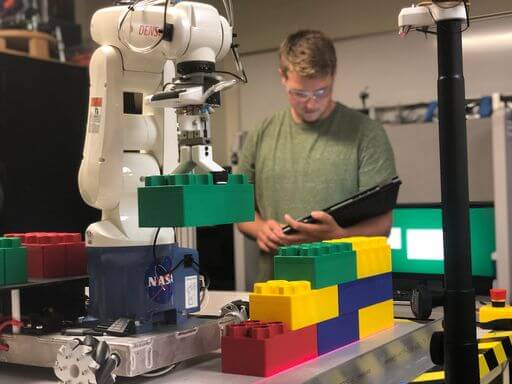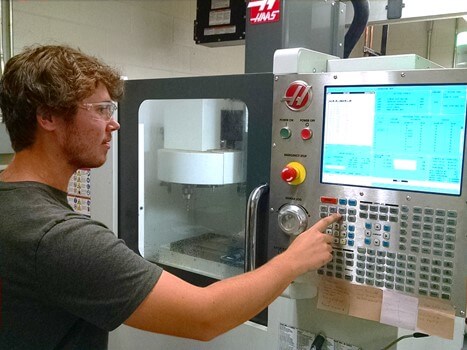It goes without saying that the energy industry is one of the world’s largest and most vital. Without energy, there would be no fridges keeping our milk cold, no rechargeable batteries for the phones we cannot live without, and no Internet keeping us connected. It’s safe to say the industry is broad and far-reaching; hence, its best professionals are the ones that boast interdisciplinary backgrounds.
Thankfully, every year, the University of North Carolina at Charlotte (UNC Charlotte) produces quality and versatile engineers through its Master of Science in Applied Energy and Electromechanical Systems (AEES) programme.
Offered by UNC Charlotte’s William States Lee College of Engineering, the 30-credit hour engineering qualification explores the areas of energy conversion, transfer, and conservation, as well as optimal utilisation of resources. Students have an opportunity to study and implement methods of analysis and optimisation of energy processes, and to learn about the development of environmentally-friendly, resilient and sustainable energy systems. The programme’s goal is to prepare individuals to thrive in not just the energy sector, but also equip graduates with the latest and sought-after expertise in electromechanical systems, including mechatronics, robotics, additive manufacturing, machine learning, and artificial intelligence.

A 20:1 student-to-faculty ratio makes it possible for students here to get personalised attention and forge teaching relationships that last a lifetime. Source: UNC Charlotte
Customisable modules and numerous opportunities to explore other STEM disciplines across the university ensure all career goals, interests, and pathways are catered to. This unique approach ensures all AEES students can rest assured knowing that wherever they end up professionally, they will be ready — a fact proven by a recent survey of alumni, performed by the College of Engineering, reporting high satisfaction in the quality of education and professional preparedness.
The programme maintains its reputation by incorporating high-impact learning practices based on real-world engineering scenarios that are common today and will emerge tomorrow. All assignments and projects encourage collaboration, especially since succeeding in a professional environment requires plenty of it.
There’s a lot to discover within a diverse student and faculty population. In terms of gender, ethnicity, professional background and research specialities, the programme’s impressive lineup of faculty members bring a wide array of perspectives and an unrivalled breadth of knowledge into classrooms. Enrolled students represent all genders, nationalities, upbringings, academic backgrounds and aspirations.
Forging connections while gaining cultural perspectives is crucial for success across the three delivery options students in the AEES programme can choose from: Thesis, Project (non-thesis), or Comprehensive Exam. Each route requires the completion of core courses, elective courses, and a capstone experience.
The Thesis option is especially ideal for those keen on conducting research. These learners will be able to work directly with a research advisor to formulate a research plan to present to the thesis review committee. Upon approval, students will then seek cutting-edge discoveries alongside their advisors before translating findings into a written thesis and delivering an oral defence of their research work to the committee.

UNC Charlotte is consistently ranked as one of the top academic institutions in the Southeast and accredited by the Commission on Colleges of the Southern Association of Colleges and Schools (SACS) to award baccalaureate, master’s, intermediate, and doctoral degrees. Source: UNC Charlotte
Anything is possible in one of UNC Charlotte’s many state-of-the-art engineering laboratories, each designed to provide instructional/research support in the topical areas of robotics, fluids, stress, power systems, digital electronics, microprocessors, PLCs, and communications. In these spaces, those who aren’t working on their thesis will be able to practise excelling in methods commonly tasked within the energy and electromechanical industry.
According to UNC Charlotte’s data, nearly every AEES graduate has secured employment within the engineering industry while a smaller group opted to pursue doctoral success with a Ph.D. instead.
Those who could not wait to put their newfound knowledge to use hold working titles such as Automation Engineer, Controls Engineer, Design Engineer or Analyst. Recent AEES graduates can be found adding value in esteemed organisations such as Schaeffler, CVS Health, Naval Air Systems Command (NAVAIR), Emerson, Duke Energy, General Dynamics, PTC, Honeywell, Trane, Johnson Controls, Schweitzer, HP, Dupont, and the National Renewable Energy Lab.
Achieving mastery often compels international students to return to their home country and contribute to the economy they grew up around. However, most programme graduates — international and domestic — tend to seek employment across the US.
Remaining in Charlotte, North Carolina is a popular decision for obvious reasons — it is the state’s largest and most dynamic city, fast becoming a hot spot for major corporations. In fact, data from the Charlotte Regional Business Alliance shows the demand for tech jobs in Charlotte has increased 17% in the last few months.
The AEES’s STEM designation means international students who apply for the Optional Practical Training extension will be able to show these businesses what they’re made of for up to 36 months before possibly landing full-time employment. With a UNC Charlotte qualification, the sky’s the limit. To energise your future, learn more here!
Follow UNC Charlotte on Facebook, Instagram, Twitter, YouTube and LinkedIn










